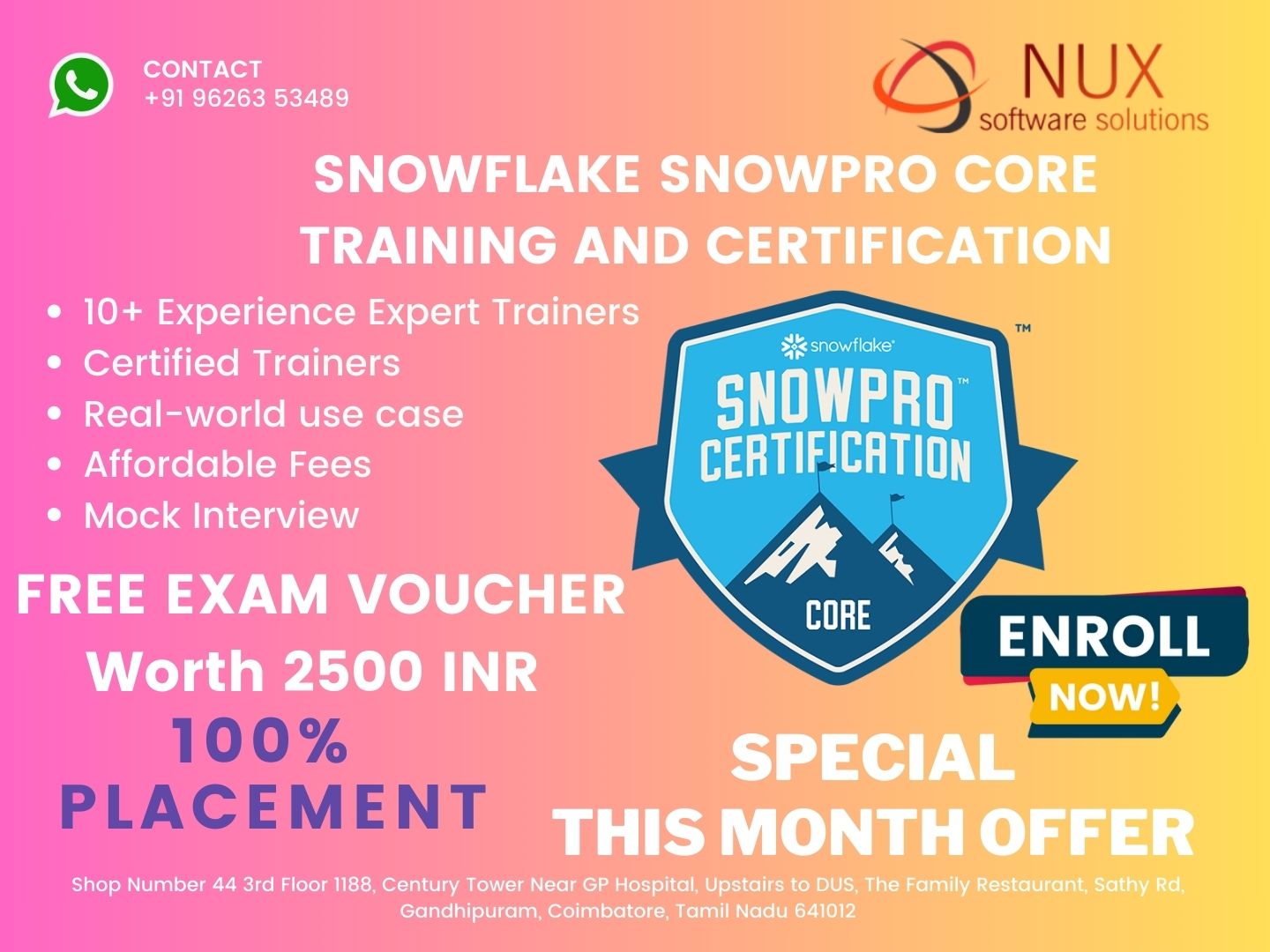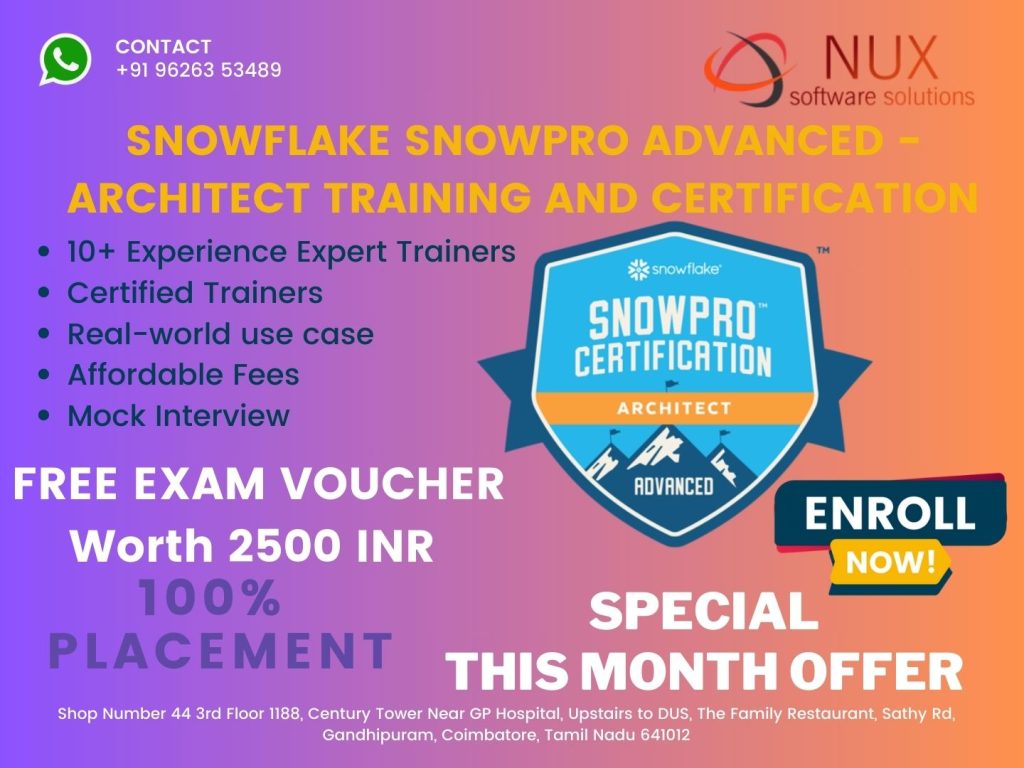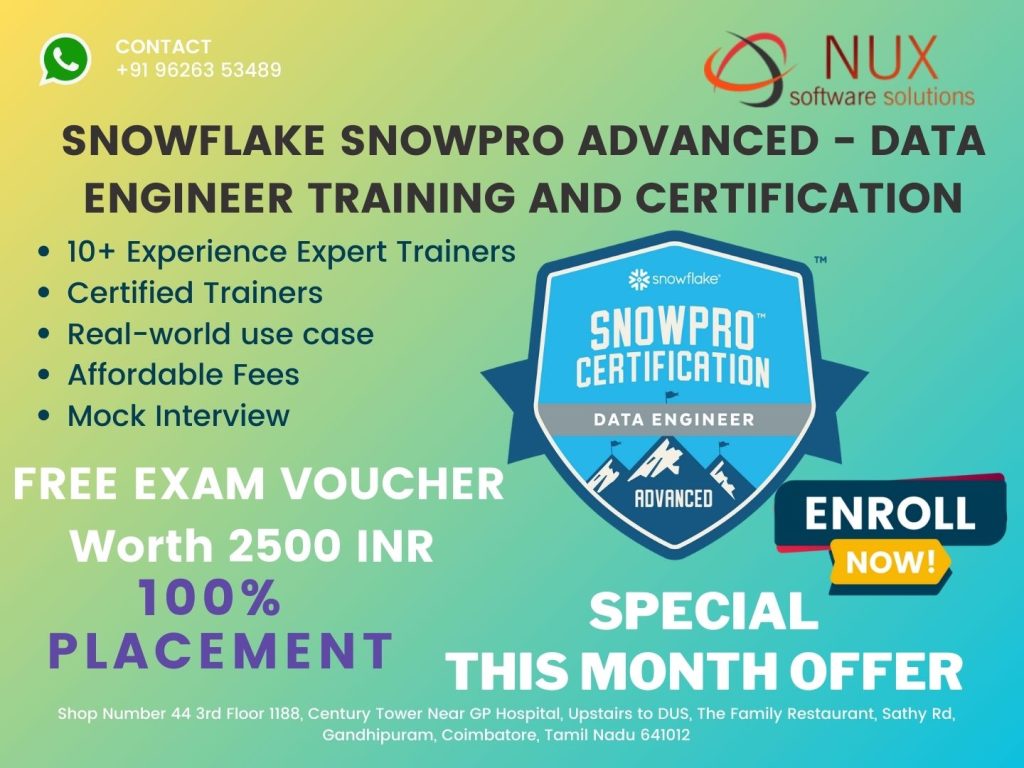Snowflake SnowPro Core

Course Summary
The SnowPro Core Certification validates your foundational knowledge of Snowflake, the leading cloud-native data platform built for modern analytics, scalability, and performance. This training introduces professionals to Snowflake’s core architecture, features, and capabilities — from storage and compute layers to security, data sharing, and cost management.
This course is designed for data professionals, analysts, engineers, and administrators who want to gain a solid working understanding of Snowflake and pass the official SnowPro Core certification exam.
Why Choose This Course
Snowflake is transforming how organizations store, process, and share data across clouds. Whether you’re a data engineer or analyst, understanding the platform’s core is critical. This training gives you:
A complete introduction to Snowflake’s core concepts
Hands-on labs to work with real Snowflake environments
In-depth preparation for the SnowPro Core Certification exam
Expert-led sessions focused on best practices and live use cases
The skills needed to build and manage cloud data solutions confidently
At Linux Training Center, our course is led by certified instructors with extensive Snowflake experience, ensuring real-world learning and exam success.
Who Should Enroll
This course is ideal for:
Data analysts, engineers, and administrators beginning their Snowflake journey
Business intelligence professionals transitioning to the cloud
IT professionals working on cloud data platforms or modernization projects
Learners preparing for the SnowPro Core Certification
Anyone seeking to understand Snowflake for use in analytics, reporting, or data engineering
Skills You Will Gain
Navigating and managing Snowflake environments
Configuring and working with warehouses, databases, and schemas
Managing user roles, access control, and permissions
Loading and querying structured and semi-structured data
Monitoring performance and managing compute usage efficiently
Preparing confidently for SnowPro Core Certification
Career Benefits
After completing this course, you will:
Be fully prepared to pass the SnowPro Core Certification exam
Open doors to roles such as Snowflake Analyst, Data Engineer, BI Developer, or Cloud Data Administrator
Validate your skills on one of the most in-demand data platforms globally
Build a foundation for advanced Snowflake certifications (Admin, Architect, Data Engineer)
Gain practical, job-ready skills that are valued across industries and geographies
Begin Your Snowflake Journey with Confidence
Snowflake is rapidly becoming the platform of choice for data and analytics. This certification is the first step toward mastering cloud data engineering and analytics in a modern data-driven world.
Start with SnowPro Core. Advance with confidence.
Snowflake SnowPro Core Syllabus
Modules
Snowflake Data Cloud Features and Architecture - 25%
- Outline key features of the Snowflake Data Cloud.
Elastic Storage
Elastic Compute
Snowflake’s three distinct layers
Data Cloud/ Data Exchange/ Partner Network
Cloud partner categories
- Outline key Snowflake tools and user interfaces.
Snowflake User Interfaces (UI)
Snowsight
Snowflake connectors
Snowflake drivers
SQL scripting
Snowpark
- Outline Snowflake’s catalog and objects.
Databases
Schemas
Tables Types
View Types
Data types
User-Defined Functions (UDFs) and User Defined Table Functions (UDTFs)
Stored Procedures
Streams
Tasks
Pipes
Shares
Sequences
- Outline Snowflake storage concepts.
Micro-partitions
Types of column metadata clustering
Data Storage Monitoring
Search Optimization Service
Account Access and Security - 20%
- Outline security principles.
Network security and policies
Multi-Factor Authentication (MFA)
Federated authentication
Single Sign-On (SSO)
- Define the entities and roles that are used in Snowflake.
Outline how privileges can be granted and revoked
Explain role hierarchy and privilege inheritance
- Outline data governance capabilities in Snowflake.
Accounts
Organizations
Databases
Secure views
Information schemas
Access history and read support
Performance Concepts - 15%
- Explain the use of the Query Profile.
Explain plans
Data spilling
Use of the data cache
Micro-partition pruning
Query history
- Explain virtual warehouse configurations.
Multi-clustering
Warehouse sizing
Warehouse settings and access
- Outline virtual warehouse performance tools.
Monitoring warehouse loads
Query performance
Scaling up compared to scaling out
Resource monitors
- Optimize query performance.
Describe the use of materialized views
Use of specific SELECT commands
Data Loading and Unloading - 10%
- Define concepts and best practices that should be considered when loading data.
Stages and stage types
File size
File formats
Folder structures
Ad hoc/bulk loading using the Snowflake UI
- Outline different commands used to load data and when they should be used.
CREATE PIPE
COPY INTO
GET
INSERT/INSERT OVERWRITE
PUT
STREAM
TASK
VALIDATE
- Define concepts and best practices that should be considered when unloading data.
File formats
Empty strings and NULL values
Unloading to a single file
Unloading relational tables
- Outline the different commands used to unload data and when they should be used.
LIST
COPY INTO
CREATE FILE FORMAT
CREATE FILE FORMAT … CLONE
ALTER FILE FORMAT
DROP FILE FORMAT
DESCRIBE FILE FORMAT
SHOW FILE FORMAT
Data Transformations - 20%
- Explain how to work with standard data.
Estimating functions
Sampling
Supported function types
User-Defined Functions (UDFs) and stored procedures
- Explain how to work with semi-structured data.
Supported file formats, data types, and sizes
VARIANT column
Flattening the nested structure
- Explain how to work with unstructured data.
Define and use directory tables
SQL file functions
Outline the purpose of User-Defined Functions (UDFs) for data analysis
Data Protection and Data Sharing - 10%
- Outline Continuous Data Protection with Snowflake.
Time Travel
Fail-safe
Data Encryption
Cloning
Replication
- Outline Snowflake data sharing capabilities.
Account types
Snowflake Marketplace and Data Exchange
Private data exchange
Access control options
Shares



